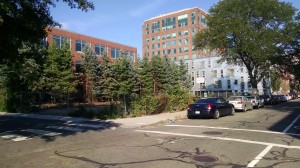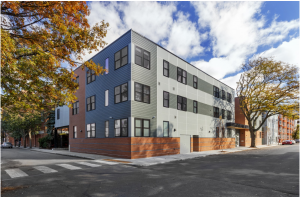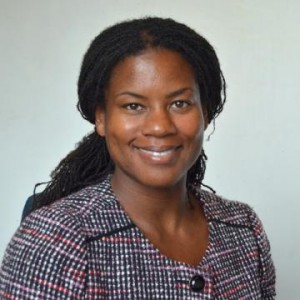Monthly Archives: May 2017
Jason Korb: 100% Affordable Housing at Port Landing
Link
The walk from the heart of Central Square to 131 Harvard Street, the home of Port Landing is deceptively short. Although separated by a mere ten minutes the transition into The Port, or Area 4, is sharp. Niche brunch spots, graffiti murals, and glass encased gyms become average brick and mortar buildings. A shiny new playground passes by to my right. A Cambridge Residents Alliance van sits parked along the street. The grinning faces of people of color are displayed on large apartment flyers, encouraging applications.
The sharp demarcation is reflective of larger forces that have resulted in increased development and housing prices in Central Square/Kendall over the past decade or so. Included in these forces are rent deregulation of 1994, the increasing cost of land and an influx of tech companies and their employees. A review can be found in this BuQuad article from 2013.
Another way to describe what we see in Area 4 is gentrification, a term first coined by Sociologist Ruth Glass in 1964. She defines it as the “process of neighborhood change that results in the replacement of lower income residents with higher income ones.” Increasing the amount of affordable housing is one way to combat the displacement associated with gentrification.
Enter: Port Landing. Port Landing is a 20 unit development with 100% affordable housing. While it is an attempt to create space in Cambridge for low and middle-income housing, Port Landing was made possible via a complex history directly intertwined with a Biotech development company.
In order to build an office building on Broadway St. the organization was contracted to donate a large sum of money to the community of The Port and a parcel of land at 131 Harvard St. was deed restricted for community use and returned to the community. Due to an unfortunate series of mismanagement, the land sat empty and unused for years. The land was eventually placed on the market, but the deed restriction meant the land could only be used as affordable housing, a community park, community garden etc. This drastically lowered the cost of the land and presented an opportunity for Jason Korb and his partners at CapStone Communities LLC to build Port Landing.
Even with the affordable price of land, making Port Landing financially feasible required a complex combination of low-income housing tax credits (LIHTC), investment tax credits, and soft debt. LIHTC specifically are a government incentive for private investment and financing of affordable housing. To some estimates LIHTC support 90% of all affordable housing in the US. Mr. Korb is concerned that these essential tax credits may be on the chopping block for HUDS and the current administration, as they are considered to be entitlements.
According to Mr. Korb rather than discouraging public-private partnerships and investment in affordable and mixed-income housing, we should be encouraging it. Policies like inclusionary zoning [linking the production of affordable housing to market price housing] and density bonuses [allow developers of market rate housing to increase the amount of housing built if affordable housing is included] are important ways to incentivize the creation of more affordable housing.
Korb and his partner at CapStone have invested the same amount of attention to the design of Port Landing as they have to its financing. The building is a beautiful blend of the brick and modern sleek steel. The interior is intentionally designed. A giant wallpaper map of Cambridge greets you as soon as you walk in and portraits of members of the community line every hallway. One community member put it this way:
Korb says he is just happy to provide “homes worthy of the people who live in them.”
PC: Patrick Rogers Photography
listen to our interview here:
Interview With Dom at ZUMIX
Two weeks ago, Tabia and I visited Zumix to meet up with Britany’s class to conduct our interviews. I was excited to see the space as I missed the whole class visit due to a concussion, so I was really excited to be able to get more of an understanding of what Zumix was about. When we walked in the door we were met by two people the sitting behind a desk collaborating on a what seems to be a song. The younger looking one holds a guitar and seems to be explaining a section of the song to the other person. The older one looks up long enough to tell us how to sign in and where to go, but both are clearly quite invested in their project. Tabia and I follow their instructions down the stairs and to a small classroom where students work fairly independently in front of computers, each headphone clad student cutting up sections of audio together various audio tracks.
We ended up interviewing a student named Dominic. Dominic is a sophomore in high school who has been taking classes at Zumix since last summer. Zumix is an organization that works with kids teaching them how to make and produce their own music; some of which they play on their Zumix Radio and stream online. Music is not their only focus, however, and Dom’s class is currently working on a project about a problem that greatly effects his community of East Boston: gentrification. In his interview Dom explains how his class conducts interviews with members of the community to learn their stories of how gentrification has effected them or people they know, and he hopes that by sharing these stories with a wider audience, the city might begin to address the legitimate concerns of the community.
Interview with Ceasar McDowell
This Wednesday I interviewed Ceasar McDowell, a professor within MIT’s Urban Studies department. He has done a profound amount of work over the years on issues like rent control and working to create community awareness on gentrification, in areas such as Central and Roxbury Crossing. He spoke that a central issue with gentrification was that it can creep in without people realizing it: developer’s projects are often reviewed on a one-by-one basis, and it can be hard for communities to be aware of the holistic effects of these development projects in terms of transforming the socioeconomic landscape of existing communities. His work relates to giving communities a channel to communicate with each other and be aware of the overall impact of development projects in a way that allows them to make decisions that will protect their community members.
He views the biggest challenge associated with addressing gentrification and displacement in Boston is increasing civic engagement of people who are most affected by these issues. He spoke about how organizations surrounding these issues often are not diversely represented by people who are most affected – and works towards spreading the engagement and education process to these communities by incorporating information in a way that would allow them to encounter them in a day-to-day setting: at banks, libraries, public transportation, etc.
One thing that we also talked about was the role of MIT in gentrifying the Cambridge area. He notes that although MIT is an academic institution and often is thought of as benevolent, its role and motives in terms of occupying space in Cambridge is also that of any other real estate developer. As someone who represents MIT, he and other professors in his department feel it’s necessary to take action and be involved in the conversation surrounding MIT’s impact on gentrification, mentioning he and other professors are involved in spaces such as the Cambridge Citizens Alliance.
Link to interview: https://www.dropbox.com/s/j800bt2law0ynvb/mcdowell.m4a?dl=0
Interview with Dom from Zumix
Last week, I interviewed Dom, a student at Zumix. I opened the conversation by asking Dom about his work at Zumix and how he got involved. Dom first joined because his father signed him up for classes, but since then, he has found a family at Zumix. Currently, Dom and his class are working on a compilation of street interviews from members of East Boston and youth activist about gentrification. HIs ultimate goal is to raise awareness about systemic gentrification in East Boston and to spread information about gentrification resources. Much like the guest speaker noted in our class last week, Dom pointed out that though many Latinos in East Boston are aware that many landlords are raising rent prices, there is little knowledge of resources and legal options to keep their homes. We also discussed the language barrier that prevents many families from seeking legal action, which he says makes displacement disproportionally worse for latinos in the area.
Though only 16, Dom had an extensive knowledge of gentrification and its detriments and injustice. He hopes to continue to work on the issue and hopes that stories like the ones he is collecting spread all over Boston–and to lawmakers who have the power to protect more East Bostonians through legislation.
https://drive.google.com/a/zumix.org/file/d/0B4DQunuyHobSSzFKVHdoM0lEWVk/view?usp=sharing
Interview with Zumix – Dom
I interviewed Dom, a student from East Boston High School, who takes classes at Zumix. Dom was a resident of East Boston, and had been a part of Zumix for the past year.
My interview with Dom was very interesting because not only was I taken aback by the eloquence of such a young boy, but I was also pleasantly surprised by the fact that he knew how to operate the radio booth and was learning audio editing skills.
One of the most relatable things for me in my interview with Dom was thw conversation we had about the understanding of gentrification amongst the teens of East Boston. Dom said that for many of his friends, gentrification didn’t mean very much because they had never seen what was before. He said that he has very recently started working on the gentrification project. As a part of the project he tries explaining the meaning and consequences of gentrification to the youth of East Boston. Dom stressed on the importance of youth movements in order to really make changes.
Dom hopes to continue working on gentrification even after he is done with his classes at Zumix.
Interview with Lydia at Zumix
I interviewed Lydia, one of the students at Zumix who is currently working on a project to highlight voices of the East Boston community in a discussion about gentrification and displacement in that neighborhood. She and a group of her peers, which she refers to as the “street team” interview people off the street about gentrification, and they collect information and stories about how gentrification is affecting communities and families in East Boston. The students also help educate those they interview about ways to resist gentrification, including distributing information about organizational meetings against displacement and resources for legal help.
Lydia says the project has helped her realize just how much the issues of gentrification and displacement have affected the people she knows personally in her life, and says that often times the people she speaks are also surprised to hear about friends and family who may be facing the same thing, and about the resources that are available to them.
Next steps for Lydia entail sifting through the interviews she has conducted, looking for “golden nuggets”, or clips of audio that will help her and her peers build a story to tell about gentrification in East Boston, and putting them together to be played on the Zumix radio!
Hacking Discrimination — Hackathon
There are many strategies hackathon event organizers use to make these contest more inclusive, equitable, and aligned with social justice. One practiced way to do this is by aligning the task and theme of the event to problems which are faced by the very groups which are minorities in common hackathons. This previous weekend, MIT hosted the event Hacking Discrimination which is a hackathon intended to provide a mechanism for meaningful dialog, learning, networking and solution development. Students were challenged to develop technical solutions to complex problems relating to bias, discrimination, and racism. The idea stemmed from Black MIT alumni in Washington, DC whom were frustrated by violence in the news, and the continued social and economic roadblocks hindering progress for minorities in their communities. This led to the creation of a Hacking Discrimination Fund, set up at MIT to further annual brainstorming for ideas which will change the narrative seen in the news. This is a step forward in creating hackathons which will lead to social change where it matters most.
Interview with Lydia Edwards, Deputy Director of the Boston Office of Housing Stability
https://www.dropbox.com/s/u9bizp06n14a1ah/interview%20lydia%20edwards_01.mp3?dl=0
Lydia Edwards is the Deputy Director of the Boston Office of Housing Stability, the first of its kind in the US. I first met Lydia at a Cambridge Residents Alliance event last Sunday, where she discussed her office’s purpose and the programs they have developed, including tax credit incentives for landlords to keep rents at affordable prices, a resolution in the works that would require just cause for evictions, and manuals for both tenants and landlords on their rights and the resources available to them. I was able to get a short interview with her during lunch – she has been very busy since she is taking a leave of absence to run for city council starting tomorrow.
Lydia has an interesting take on gentrification and displacement because of her legal background and her experience as a landlord herself. She believes that both tenants and landlords must be at the table in discussions of displacement. She describes gentrification as a market force that should not be used synonymously with displacement, and believes that it is actually possible for a neighborhood to be gentrified without displacing the existing communities if the community is invested in equally. Lydia and her office are both deeply involved with existing community organizations, such as Vida Urbana and the Cambridge Residents Alliance. Lydia goes to Vida Urbana meetings on a monthly basis to get suggestions for resources to work on.
When I asked her about her opinions on MIT’s influence on Cambridge land and housing, she emphasized that while universities are a big part of the Cambridge/Boston culture and a big part of this area’s “draw,” universities should build more dormitories so that students are not over-saturating and competing people in the housing market, rather than using marketing tools and community liaisons like the Volpe center.
Unfortunately, her PR representative had me cut the microphone before the interview was complete, but her biggest dream for 2030 is to be a mother and to see Boston’s housing market reflect an economically diverse community.
An Interview with Kathryn Fenneman at Tutoring Plus
For this week, I interviewed Kathryn Fenneman from Tutoring Plus, an organization dedicated to youth and families in the Cambridge Area 4/Central Square community. We had an amazing conversation about gentrification, the right to the city, and displacement from a very different and unique point of view. I personally became interested in the role of education in combatting these issues after speaking with the Cambridge Community Foundation, who recommended that I reach out to Kathryn.
One of the things that was the most striking to me was before the interview, where Kathryn expressed a bit of hesitation. She made a point that we should be speaking with the community members as well, and that she did not speak for the community. As the CoDesign studio, this was really great for me to hear that concern, and definitely something that we have discussed in class as well.
We spoke about Kathryn’s activist work, how she got involved in the community. We spoke about the Cambridge poverty rates, and the disconnect between what we think about Cambridge (MIT and Harvard), and the neighborhoods and families that are being forgotten and left behind by Biotech companies and corporations.
Our conversations about barriers, as well, was great. We had a conversation about the giant glass walls of MIT, Harvard, and all the other corporations and institutions: even though many of the students live next door, they sometimes don’t feel welcome, or have the right to go in, or access its resources. One way that Tutoring Plus is involved is breaking this physical and symbolic barrier: bringing students into the Media Lab and MIT, involving them in the community, and also bringing in volunteers from these institutions to see the greater community.
Her vision for 2030?: Ending childhood poverty in Cambridge.
Our interview went really well–I felt more comfortable during this interview than the previous ones, and felt much more confident as the interviewer. A transcript will go up soon!






